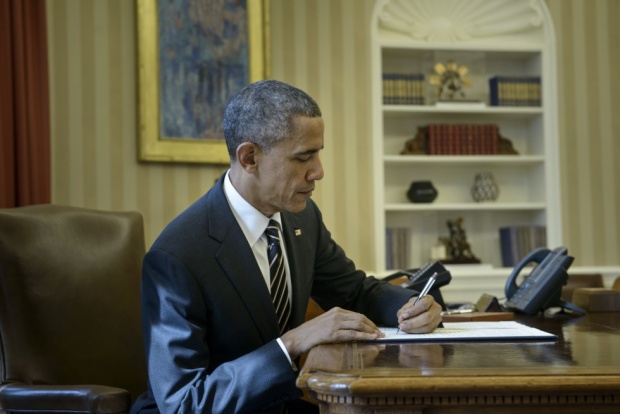US President Barack Obama on Monday said it would be a “fundamental misjudgment” to demand Iran recognise Israel as part of a nascent nuclear deal.
In a drive to sell the deal to a hostile Congress, Obama told US radio network NPR that demands for Iran to recognise Israel go beyond the scope of the agreement.
“The notion that we would condition Iran not getting nuclear weapons in a verifiable deal on Iran recognising Israel, is really akin to saying that we won’t sign a deal unless the nature of the Iranian regime completely transforms,” he said.
“And that is, I think, a fundamental misjudgment.”
Obama has said that Iran should stop threatening Israel and cease engaging in proxy wars around the Middle East, but that he has tried to separate concerns about Iran’s regional role from the tentative deal finalised Thursday.
“We want Iran not to have nuclear weapons precisely because we can’t bank on the nature of the regime changing. That’s exactly why we don’t want it to have nuclear weapons.
“If suddenly Iran transformed itself to Germany or Sweden or France, then there would be a different set of conversations about their nuclear infrastructure.”
Israeli Prime Minister Benjamin Netanyhau on Friday said that any final agreement with Iran must include “clear and unambiguous Iranian commitment of Israel’s right to exist”.
“A better deal would roll back Iran’s vast nuclear infrastructure, and require Iran to stop its aggression in the region, its terror worldwide and its calls and actions to annihilate the state of Israel,” Netanyahu told CNN.
Working with Gulf countries
Also Monday, Obama said he would continue to work with US partners to address Iran’s “destabilizing activities” in the Middle East, even as details of a nuclear deal with Tehran are thrashed out.
During a phone call with Sultan Qaboos, Obama pledged to work “with Oman and other regional partners to address Iran’s destabilizing activities in the region,” the White House said.
Obama’s call was part of a drive to convince sceptical allies that a tentative deal over Iran’s nuclear programme does not signify a softening of US opposition to Iran’s role in the region.
Arab states accuse Iran of fuelling a series of proxy battles in the Middle East that have destabilised Syria, Iraq, Yemen, Lebanon and other states.
Obama has invited leaders of the several Gulf states to Camp David in the near future in a bid to assuage their concerns.
Republicans reaffirm opposition to deal
Earlier Monday, Republican US Senate majority leader Mitch McConnell criticised the nuclear deal with Iran, confirming that lawmakers opposed to the pact planned a formal response to the agreement.
“The administration needs to explain to the Congress and the American people why an interim agreement should result in reduced pressure on the world’s leading state sponsor of terror,” McConnell said in a statement following last week’s marathon talks.
McConnell repeated his pledge to examine legislation proposed by Senators Bob Corker and Bob Menendez, which requires any deal on Iran’s nuclear ambitions to be reviewed by Congress.
The Corker-Menendez bill would oblige President Barack Obama to give lawmakers 60 days to examine, and possibly block, a nuclear deal.
Obama has vowed to veto the bill in its current form, as well as a separate bill that would impose additional sanctions on Iran.
Republicans however are united behind the strategy of seeking to thwart an agreement, and have also won support from a sizable number of Democrats.
The powerful Senate Foreign Relations Committee is due to meet on 14 April to consider the bill, paving the way for its consideration by the full Senate before heading to the House of Representatives, also Republican-controlled.
Republicans have criticised the fact that the framework deal reached last week allows Iran to keep several thousand centrifuges, continue its research and development program and maintain a controversial underground laboratory at Fordo.
“Under no terms should the administration suspend sanctions, nor should the United Nations remove sanctions, until the Iranians reveal all aspects of the possible military dimensions of its previous research,” McConnell added in his statement.
The Obama administration has mounted a political offensive aimed at giving him a free hand until 30 June, the deadline for finalising an Iran deal.
Obama last week warned Congress against moves to torpedo the Iran agreement.
“If Congress kills this deal, not based on expert analysis and without offering any reasonable alternative, then it’s the United States that will be blamed for failure of diplomacy,” Obama said Thursday. MEM






 WhatsApp us
WhatsApp us 

